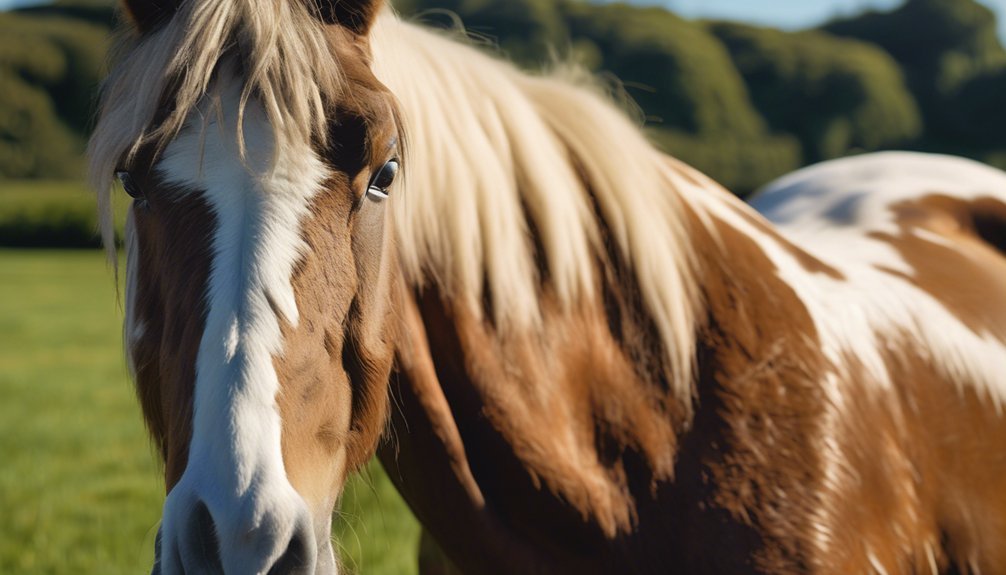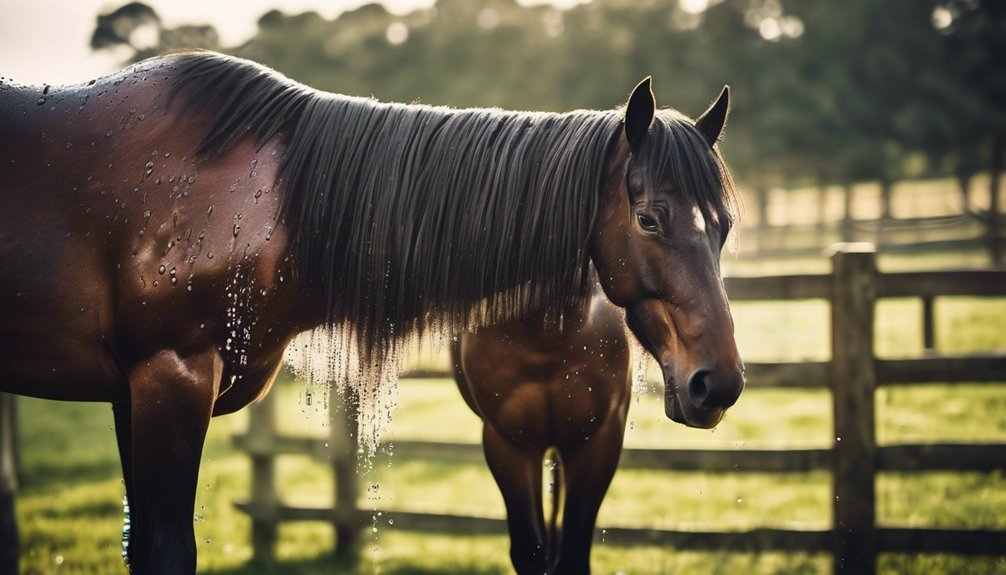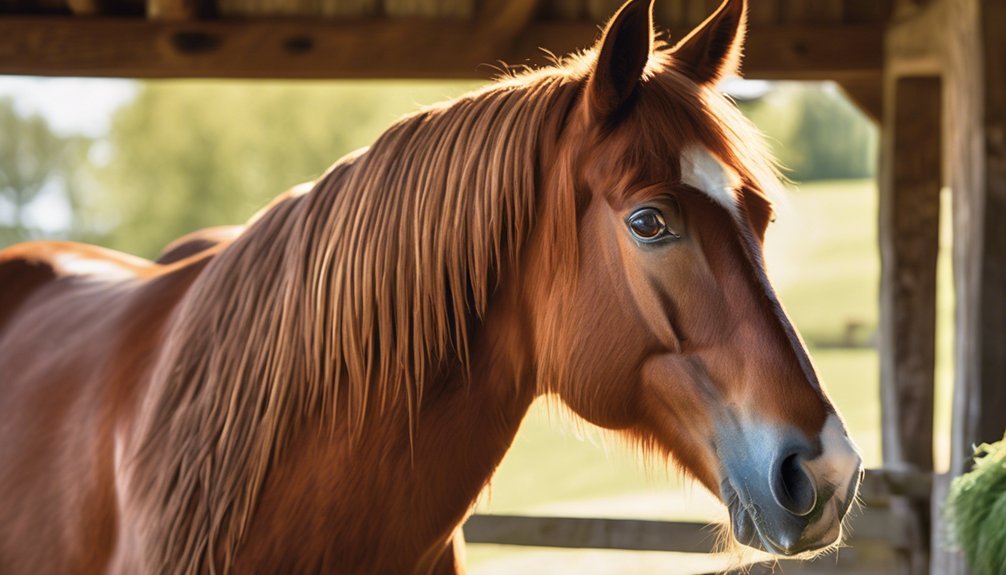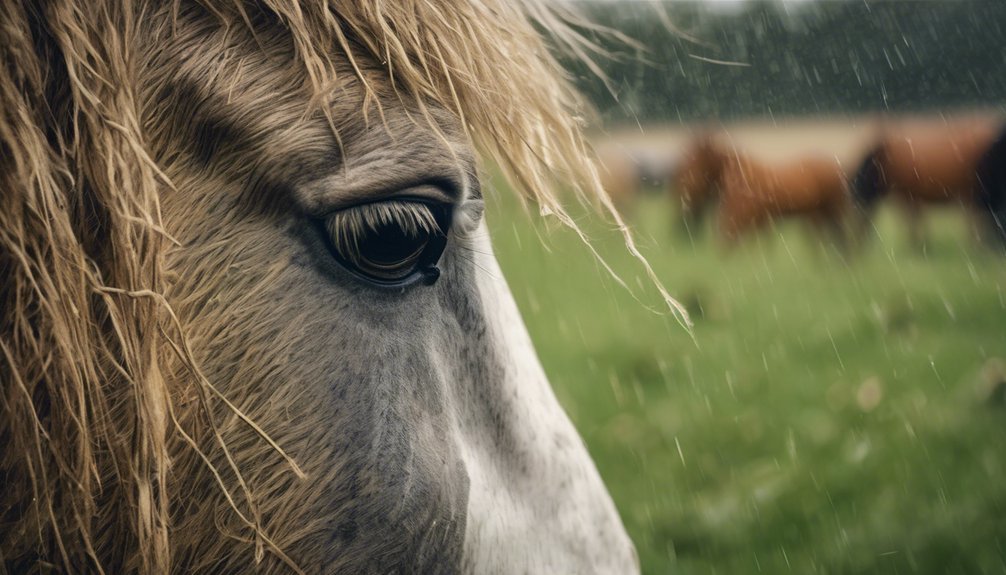
Greasiness in horse coats can be frustrating and may indicate underlying issues. It often stems from factors like improper grooming, diet, or health problems. To effectively manage greasiness, you'll need to implement a comprehensive approach that includes proper grooming techniques, the right shampoo, and a balanced diet. By understanding these elements, you can significantly improve your horse's coat condition and overall health. Let's explore the best strategies to tackle this issue.
Key Takeaways
- Implement a regular grooming routine with appropriate tools to remove dirt and distribute natural oils evenly across the coat.
- Choose a shampoo specifically formulated for greasy coats, focusing on natural ingredients and pH balance to promote coat health.
- Ensure a balanced diet rich in high-quality proteins, Omega fatty acids, and essential vitamins to improve coat appearance and health.
- Monitor for underlying health issues, such as skin conditions or hormonal imbalances, and consult a veterinarian if necessary.
- Reduce stressors in the horse's environment, as stress can contribute to increased oil production and greasiness in the coat.
Understanding the Causes of Greasiness in Horse Coats

When you notice greasiness in your horse's coat, it's essential to understand the underlying causes to address the issue effectively.
Common causes include inadequate grooming, which can lead to an accumulation of dirt and oil. However, you should also consider hormonal imbalances, particularly in mares, as these can impact skin health and coat condition.
Factors such as diet, stress, and environmental conditions may further exacerbate the greasiness.
If your horse's coat remains oily despite proper care, it's wise to consult your veterinarian. They can help identify any underlying health issues and suggest appropriate treatments.
Ultimately, knowing these factors empowers you to take proactive steps, ensuring your horse maintains a healthy, lustrous coat.
The Importance of Proper Grooming Techniques
Proper grooming techniques play a vital role in maintaining your horse's coat health and preventing greasiness. Using the right grooming tools, like curry combs and body brushes, helps distribute natural oils evenly, enhancing coat condition.
Regular grooming frequency is essential; aim for at least several times a week, or daily if your horse is particularly active or exposed to dirt and sweat. This routine not only removes dirt and debris but also stimulates blood circulation to the skin, promoting healthier hair growth.
Pay special attention to areas prone to greasiness, such as the belly and flanks. By committing to consistent grooming, you're fostering a close bond with your horse while ensuring its coat remains clean and vibrant.
Choosing the Right Shampoo for Your Horse

How can you ensure your horse's coat stays healthy while addressing greasiness? Selecting the right shampoo is crucial. Look for products that feature:
- Natural ingredients to nourish the skin
- pH balance to maintain coat health
- Formulas designed specifically for greasy coats
- Moisturizing properties to prevent dryness
- Hypoallergenic options for sensitive skin
Choosing a shampoo with natural ingredients not only helps combat greasiness but also protects your horse's coat from harmful chemicals.
A balanced pH is essential, as it keeps the skin's natural oils in check.
Evaluate your options carefully, and don't hesitate to consult your veterinarian if you're unsure.
The right shampoo will make a significant difference in your horse's coat condition and overall well-being.
Regular Bathing and Its Benefits
Regularly bathing your horse not only helps manage greasiness but also promotes overall coat health.
Maintaining an appropriate bath frequency—typically every two to four weeks—can effectively reduce oil buildup and keep the coat clean. When selecting soap, opt for gentle, equine-specific formulas that won't strip natural oils while still combating grease.
Always ensure you rinse thoroughly to prevent residue, which can lead to skin irritation. Bathing also stimulates circulation, enhancing the coat's shine and softness.
Remember to monitor your horse's skin condition; if you notice excessive dryness or irritation, adjust your bathing routine or soap selection.
A consistent grooming regimen, paired with regular baths, fosters a healthy, glowing coat that reflects your bond with your horse.
Nutrition's Role in Maintaining Coat Health

Nutrition significantly impacts your horse's coat health, as the right diet provides essential nutrients that promote a shiny, well-conditioned coat. Ensuring your horse receives balanced nutrition is crucial, and you can consider the following:
- High-quality protein sources for hair strength
- Omega-3 and Omega-6 fatty acids for sheen
- Vitamins A, E, and biotin for skin and coat health
- Antioxidants to combat oxidative stress
- Dietary supplements specifically formulated for coat conditioning
Incorporating these elements into your horse's diet helps to reduce greasiness while enhancing overall coat appearance.
Regularly monitor your horse's condition, and consult with a veterinarian or equine nutritionist to identify any dietary gaps. A tailored nutrition plan can transform your horse's coat into a vibrant reflection of good health.
Identifying Underlying Health Issues
While a shiny coat often signifies good health, excessive greasiness can indicate underlying health issues that warrant attention. It's essential to evaluate your horse for potential skin conditions or hormonal imbalances that might be affecting coat quality. Here's a quick reference to common concerns:
| Health Issue | Possible Symptoms | Recommended Action |
|---|---|---|
| Skin Conditions | Redness, itching | Consult a veterinarian |
| Hormonal Imbalances | Changes in behavior | Blood tests for hormones |
| Allergies | Localized greasiness | Allergy testing |
| Parasites | Dullness, irritation | Deworming program |
| Nutritional Deficiencies | Patchy coat | Review diet |
Addressing these issues early can help restore your horse's coat to its optimal condition.
Environmental Factors Contributing to Coat Greasiness

Understanding the health issues that can affect your horse's coat is just the starting point.
Environmental factors play a crucial role in coat greasiness. Here are some key influences you should consider:
- Weather conditions: Extreme heat or cold can stress your horse's skin.
- Humidity levels: High humidity can promote oil production.
- Dust and dirt: Accumulation can lead to clogged pores.
- Bedding materials: Certain types may irritate the skin.
- Water quality: Hard or contaminated water can affect coat health.
When to Consult a Veterinarian
Recognizing when to consult a veterinarian is essential for maintaining your horse's coat health. If you notice persistent greasiness despite regular grooming, it's time for a symptom assessment.
Look for other signs like skin irritation, hair loss, or changes in behavior that may indicate underlying issues. A vet can help identify whether the greasiness is due to dietary problems, allergies, or infections.
Early intervention is crucial, as it opens up various treatment options tailored to your horse's specific needs. Don't hesitate to reach out if you feel something's off; your horse's comfort and well-being should always come first.
Proactive care can prevent more severe health problems down the line, ensuring your horse remains happy and healthy.
Frequently Asked Questions
Can Certain Horse Breeds Be More Prone to Greasiness?
Certain horse breeds can indeed be more prone to greasiness. You'll notice grooming techniques and dietary factors play crucial roles in managing their coat condition, so pay attention to these aspects for optimal coat health.
How Often Should I Groom My Horse to Prevent Greasiness?
Imagine running your hands through your horse's sleek coat. To maintain that shine and prevent greasiness, you should engage in daily grooming. Consistent coat maintenance not only enhances appearance but also promotes bonding and overall health.
Are There Home Remedies for Treating a Greasy Coat?
You can use home remedies like coconut oil and diluted apple cider vinegar to treat a greasy coat. Apply them sparingly, massaging gently into your horse's fur for a healthier, shinier appearance while maintaining intimacy in grooming.
Can Weather Conditions Worsen Coat Greasiness?
Did you know that horses can sweat up to 30 liters a day? High humidity effects and seasonal changes can exacerbate coat greasiness, leading to more frequent grooming needs to maintain your horse's health and appearance.
What Grooming Tools Are Best for Managing Greasiness?
To manage greasiness, you'll want to use quality grooming brushes that effectively distribute oils. Pair those with coat conditioners designed to balance moisture and grease, ensuring your horse's coat remains healthy and vibrant.
Conclusion
To tackle the troublesome greasiness of your horse's coat, combine consistent care with clever choices. Commit to regular grooming, choose quality shampoos, and prioritize a protein-packed diet to cultivate a shiny, healthy coat. Don't disregard potential health issues or environmental elements that could exacerbate greasiness. By paying attention to these factors, you'll foster a fabulous fur finish, ensuring your horse not only looks great but feels great too. Stay vigilant and proactive for optimal outcomes!





